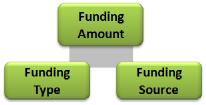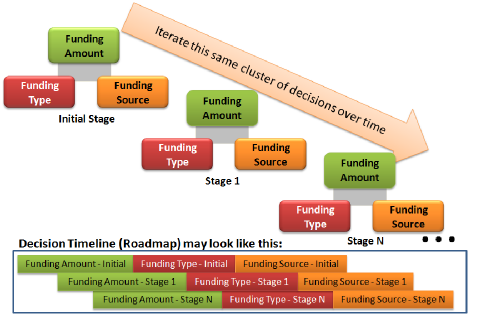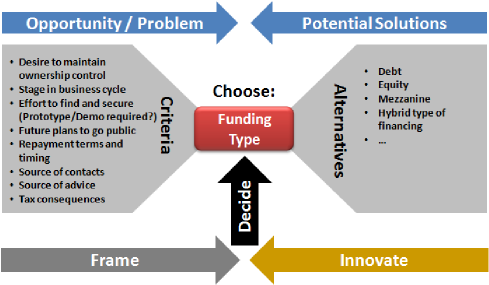Use decision management to choose your new business funding method and balance your business priorities
New business funding can be as significant source of confusion and frustration. You are just trying to choose your business startup funding approach, and after a quick internet search, you are overwhelmed with information. It's starting to look like startup funding could take more of your effort than building your business products and services.
Why is your Startup funding decision so difficult?
Are you looking for a lot of funding? Whatever the amount, that becomes the value of your decision. If you are looking for $100,000 you would expect the cost to make that decision well to be worth $500 to $2000. If it's your time, at $50/hour that would be 10-40 hours. The larger the amount you need, the greater the effort you will likely expend to get the required funding.
For investors (including banks) your business idea and plan is just one of a number of alternatives for their decision to grant you investment dollars. You are essentially creating the information that allows the investor to make the decision on where to best place their money. Startup funding creates the need for your company's first product: your business pitch and plan. Selling this plan may be the most challenging sale you need to make, and depending on funding source, there may be a lot of strong competition. While the plan is your initial product, it's important not to loose focus on the real products or services that will actually generate revenue.
Is it one decision or many?
 Dealing with new business funding is more likely to involve a number of interconnected decisions. Some of the decisions involved include deciding the amount of funding needed (do you have a budget estimate?), the type of funding desired, the funding source or sources, and specific funding timing. Add to this that a choice in one place will likely influence choices in these and other related decisions, and it starts becoming clear that you really are managing a set of related decisions.
Dealing with new business funding is more likely to involve a number of interconnected decisions. Some of the decisions involved include deciding the amount of funding needed (do you have a budget estimate?), the type of funding desired, the funding source or sources, and specific funding timing. Add to this that a choice in one place will likely influence choices in these and other related decisions, and it starts becoming clear that you really are managing a set of related decisions.
Too many unknowns?
Business startup funding has to address the large amount of uncertainty and expected changes associated with your new business concept. This typically results in breaking up financing into a set of interim funding decision points with associated milestones. Each of these interim decision points can start to be managed as part of a roadmap of related decisions. This adds an all important time element to the decision making process that starts turning information overload into knowledge that can be managed over time.

Criteria to help choose the type of new business funding
After you have decided on the amount of funding needed, and timing, you will need to make a decision on the type of funding that will best enable your business plan. This requires that you decide whether your funding should be debt, equity, mezzanine, or some hybrid type of financing. Expect to have to make this decision for each funding round, especially if there are substantial changes in the amount needed.
Criteria to consider for type of funding include:
- Desire to maintain ownership control
- Stage in business cycle
- Effort to find and secure (Prototype/Demo required?)
- Future plans to go public
- Repayment terms and timing
- Source of contacts
- Source of advice
- Tax consequences

With a few decisions made, you are able to tame the information beast
Now that you have a good handle on your new business funding amount, timing, and desired type of financing, you are better positioned to decide on your source for funds. For example, if you only need $20,000, this will eliminate at least 5 options from the following set of alternatives.
- Personal
- Insurance policy loans
- From within the company
- Bootstrapping (self funded)
- Consulting
- Leasing
- Selling stock
- Customer/supplier financing
- Friends and family
- Private
- Private lending
- Angel Investors
- Seed funding firms
- Venture Capital Funds
- Win a startup capital contest
- Business Incubator
- Commercial
- Bank Loans
- Credit Cards
- Corporate Venture Capital
- Public
- Initial Public Offerings
- Government
- State and federal grants
- Economic Development programs
Some criteria to consider when selecting your source of funds include ease of search and access, reasonable terms, low interest rate, potential impact to credit rating, and reducing risk. Deciding on funding amount, timing, and type will place constraints that will likely eliminate a number of options. This will reduce the effort to determine your best source of funding.
Ultimately, you have to find the right balance between building the business and managing the new business funding decisions for your startup. Managing your funding as part of a set of interconnected decisions provides the framework needed to enable that you keep the lights on as you grow your business.
Return from the new business funding page to the business decisions page

